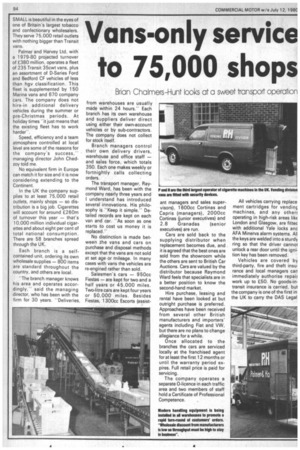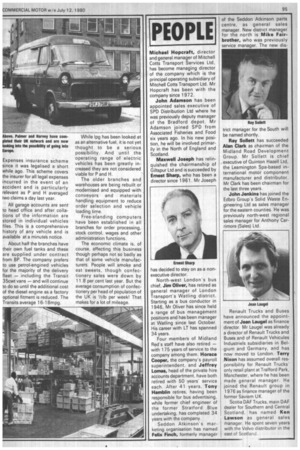Vans-only service to 75,000 shops
Page 96

Page 97

If you've noticed an error in this article please click here to report it so we can fix it.
Brian Chalmers-Hunt looks at a sweet transport operation
SMALL is beautiful in the eyes of one of Britain's largest tobacco and confectionary wholesalers. They serve 75,000 retail outlets with nothing bigger than Transit vans.
Palmer and Harvey Ltd, with a 1979-80 projected turnover of £380 million, operates a fleet of 235 Transit 35cwt vans, plus an assortment of D-Series Ford and Bedford CF vehicles of less than hgv classification. This fleet is supplemented by 1 50 Marina vans and 670 company cars. The company does not hire-in additional delivery vehicles during the summer or pre-Christmas periods. At
holiday times -it just means that the existing fleet has to work harder".
Speed, efficiency and a team atmosphere controlled at local level are some of the reasons for the company's success," managing director John Chedzoy told me.
No equivalent firm in Europe can match it for size and it is now considering extending to the Continent.
In the UK the company supplies to at least 75,000 retail outlets, mainly shops — so dis tribution is a big job. Cigarettes will account for around £260m of turnover this year — that's 10,000 million individual cigarettes and about eight per cent of total national consumption. There are 58 branches spread through the UK.
Each branch is a selfcontained unit, ordering its own wholesale supplies — 800 items are standard throughout the country, and others are local.
"The branch manager knows his area and operates accordingly,said the managing director, who has been with the firm for 30 years. "Deliveries, from warehouses are usually made within 24 hours.Each branch has its own warehouse and suppliers deliver direct using either their own-account vehicles or by sub-contractors. The company does not collect for stock itself.
Branch managers control their own delivery drivers, warehouse and office staff — and sales force, which totals 350. Each one makes weekly or fortnightly calls collecting orders.
The transport manager, Raymond Ward, has been with the company nearly three years and I understand has introduced several innovations. His philosophy is "Keep it simple." Detailed records are kept on each van and car. "As soon as one starts to cost us money it is replaced."
No distinction is made between the vans and cars on purchase and disposal methods except that the vans are not sold at set age or mileage. In many cases with vans the vehicles are re-engined rather than sold.
Salesmen's cars — 9 50cc Fiestas — are kept for two and a half years or 45,000 miles. Two-litre cars are kept four years or 50,000 miles. Besides Fiestas, 1 300cc Escorts (assist
,
ant managers and sales supervisors), 1 600cc Cortinas and Capris (managers), 2000cc Cortinas (junior executives) and 2.8 Granadas (senior executives) are run.
Cars are sold back to the supplying distributor when replacement becomes due, and it is agreed that the best ones are sold from the showroom while the others are sent to British Car Auctions. Cars are valued by the distributor because Raymond Ward feels that specialists are in a better position to know the second-hand market.
Hire purchase, leasing and rental have been looked at but outright purchase is preferred. Approaches have been received from several other British manufacturers and importers' agents including Fiat and VW, but there are no plans to change allegiance for a while.
Once allocated to the branches the cars are serviced locally at the franchised agent for at least the first 12 months or until the warranty period expires. Full retail price is paid for servicing.
The company operates a separate 0-licence in each traffic area and two members of staff hold a Certificate of Professional Corn petence. All vehicles carrying replace ment cartridges for vendinc machines, and any other operating in high-risk areas like London and Glasgow, are fittec with additional Yale locks anc AFA Minerva alarm systems. All the keys are welded into a sturdy ring so that the driver cannot unlock a rear door until the ignition key has been removed.
Vehicles are covered by third-party, fire and theft insurance and local managers can immediately authorise repair work up to £50. No goods-intransit insurance is carried, but the company is one of the first in the UK to carry the DAS Legal Expenses insurance scheme since it was legalised a short while ago. This scheme covers the insurer for all legal expenses incurred in the event of an accident and is particularly relevant as P and H averaged two claims a day last year.
All garage accounts are sent to head office and after collations of the information are stored in individual vehicles files. This is a comprehensive history of any vehicle and is available at a minutes notice.
About half the branches have their own fuel tanks and these are supplied under contract from BP. The company prefers to use petrol-engined vehicles for the majority of the delivery fleet — including the Transit 35cwt vans — and will continue to do so until the additional cost of the diesel engine as a factory optional fitment is reduced. The Transits average 16-18mpg. While lpg has been looked at as an alternative fuel, it is not yet thought to be a serious possibility. And until the operating range of electric vehicles has been greatly increased they are not considered viable for P and H.
The older branches and warehouses are being rebuilt or modernised and equipped with conveyors and materials handling equipment to reduce order selection and vehicle loading time.
Free-standing computers have been established in all branches for order processing, stock control, wages and other administration functions.
The economic climate is, of course, affecting this business though perhaps not so badly as that of some vehicle manufacturers. People will smoke and eat sweets, though confectionery sales were down by 11.8 per cent last year. But the average consumption of confectionery per head of population of the UK is 1/2Ib per week! That makes for a lot of mileage.












































































































































